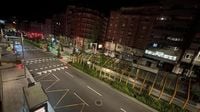Classes in Galicia are suspended on Tuesday, April 29, 2025, due to a widespread blackout affecting the region since midday on Monday. The decision, announced by the President of the Xunta, Alfonso Rueda, also includes the closure of infant schools, day centers for the elderly and people with disabilities, and the suspension of all federated sports activities.
The blackout, which impacted much of Spain and Portugal, began around 12:30 PM on April 28, leading to significant disruptions across various sectors. In a press briefing, Rueda explained that the closure of educational centers was primarily due to transportation issues. Galicia has the most extensive school transport network in Spain, and operating it under the current conditions would incur a substantial fuel cost. "It is necessary to prioritize," he emphasized, calling for a reduction in unnecessary travel to conserve energy.
As a result of the emergency, the Xunta raised the alert level from 2 to 3, meaning that the central government will now manage the crisis. This change was made following a communication from government sources indicating the need for immediate intervention. The activation of level 3 emergency allows the Ministry of the Interior to take over crisis management when local resources are insufficient.
By Monday night, the Centro Integrado de Atención ás Emerxencias-112 Galicia had managed a staggering 2,399 calls, with 704 incidents reported—nearly double the usual number. Among the most notable incidents were 142 people trapped in elevators and ten cases of flooding attributed to the blackout. Despite these challenges, essential emergency services, including the 112 emergency hotline, remained operational throughout the crisis.
Rueda urged the public to use healthcare services responsibly, stating that all health centers and hospitals would continue to operate. Users of respiratory equipment were informed they could charge their devices at the Puntos de Atención Continuada (PAC) and were encouraged to seek information through the emergency contact numbers 061 and 112.
In the wake of the blackout, the Hula hospital in Lugo had to postpone seven scheduled surgeries due to the power outage. Nevertheless, urgent procedures were carried out successfully. The situation was particularly concerning for the Alcoa factory, where the electrolytic cells had stopped functioning, raising fears about metal solidification. Fortunately, power was restored to the factory after 7:00 PM on Monday.
As of 6:00 AM on Tuesday, April 29, 2025, 99.16% of the energy demand had been recovered across the peninsula, with all substations of the electricity transport network back in service. Cities like Ferrol and Pontevedra had their power restored by 4:30 AM, while Santiago reported full restoration around 6:00 AM. The recovery process is ongoing, but Red Eléctrica has indicated that it could take between 6 to 10 hours to fully normalize the supply.
In light of the blackout, the Dirección General de Tráfico (DGT) advised against unnecessary travel, as many traffic lights were inoperative. The DGT emphasized the importance of caution on the roads until normalcy is restored. This was echoed by local authorities who established emergency contact numbers to assist residents during the crisis.
The uncertainty surrounding the Bachibac exam, scheduled for the same day at IES Neira Vilas de Oleiros, added to the anxiety among students and families. The lack of clear communication from the educational authorities left many unsure whether the exam would proceed or be rescheduled.
As residents of Galicia adapted to the blackout, many businesses faced challenges. Some shops closed, while others operated in limited capacity, relying on generators or manual systems for transactions. Reports indicated that pharmacies struggled without power and internet access, hindering their ability to dispense medications, particularly for patients relying on critical supplies like insulin.
In the aftermath of the blackout, the government has been actively investigating the cause of the outage. President Pedro Sánchez, who visited the Red Eléctrica control center, assured citizens that all available resources would be employed to resolve the situation promptly. He confirmed that there were no security issues or supply problems in hospitals despite the blackout.
As Galicia begins to recover from this unprecedented event, residents are encouraged to remain calm and patient. Rueda's call for responsible energy use and cooperation among citizens aims to ensure that the region navigates through the crisis effectively. The situation remains fluid, with updates expected as recovery efforts continue.





